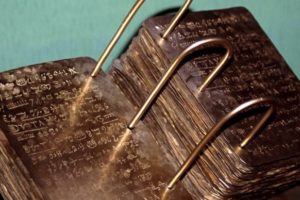The Tanakh frequently mentions “lost books” that are cited in the Tanakh, but which do not appear in the current collection of books. The list of such “lost books” includes the following:
- Book of the Wars of YHWH (Num. 21:14)
- The Book of Jasher (Josh. 10:13; 2 Sam. 1:18)
- Manner of the Kingdom by Samuel (1 Sam. 10:25)
- Acts of Solomon (1 Kings 11:41)
- Book of Samuel the Seer (1 Chron. 29:29)
- Book of Gad the Seer (1 Chron. 29:29)
- Book of Nathan the Prophet (1 Chron. 29:29; 2 Chron. 9:29)
- Prophecy of Abijah (2 Chron. 9:29)
- Visions of Iddo the Seer (2 Chron. 9:29; 12:15)
- The Midrash of Iddo (2 Chron. 13:22)
- Book of Shemiah (2 Chron. 12:15)
- Book of Jehu (2 Chron. 20:34)
- Acts of Uzziah by Isaiah (2 Chron. 26:22)
- Sayings of the Seers (2 Chron. 33:19)
We may add to these The Book of Enoch (quoted in Jude 1:14-15)
We may also add the books of the Apocrypha, many of which were found among the Dead Sea Scrolls, and most or all of which were included in the canons of the Septuagint, the Peshitta and even the original 1611 King James Version, but which are not found in the Masoretic Text, or in modern Protestant versions:
- 1 Esdras
- 2 Esdras
- Tobit
- Judith
- Wisdom of Solomon
- Ben Sira (Ecclesiasticus)
- Letter of Baruch
- Letter of Jeremiah
- 1 Maccabees
- 2 Maccabees
- 3 Maccabees
- 4 Maccabees
- As well as excerpts from longer versions of Daniel and Esther
It should come as no surprise that the Stick of Joseph says the following of the Stick of Judah, or Tanakh:
And I beheld a book, and it was carried forth among them. And the angel said unto me, Do you know the meaning of the book? And I said, I know not. And he said, Behold, it proceeds out of the mouth of a Y’hudi — and I, Nefi, beheld it. And he said unto me, The book that you behold is a record of the Y’hudim, which contains the covenants of YHWH which he has made unto the house of Isra’el; and it also contains many of the prophecies of the holy prophets. And it is a record like unto the engravings which are upon the plates of brass, except there are not so many. Nevertheless, they contain the covenants of YHWH which he has made unto the house of Isra’el; wherefore, they are of great worth unto the Goyim.… (1 Nefi 3:21)
The Brass Plates version of the Tanakh included the writings of the prophets Zenoch (1 Nefi 5:36; Alma 16:32-33; Chel. 3:9; 3 Nefi 4:11), Ne’um (1 Nefi 5:36), Zenos (1 Nefi 5:36-37; 6:2; Ya’akov 3:7; Alma 16:31-32; Chel. 3:9; 5:16; 3 Nefi 4:11), the patriarch Yosef (2 Nefi 2:2-3) and others—perhaps some of those listed earlier in this article. In fact, the Stick of Joseph often quotes from these lost books preserved on the Brass Plates.
So what happened to these lost books? The so-called “Church Father” Tertullian (c. 155 – c. 240 CE) gives us an answer. He writes concerning the Book of Enoch:
But since Enoch in the same Scripture has preached likewise concerning the Lord, nothing at all must be rejected by us which pertains to us; and we read that “every Scripture suitable for edification is divinely inspired.” By the Jews it may now seem to have been rejected for that (very) reason, just like all the other (portions) nearly which tell of Christ. Nor, of course, is this fact wonderful, that they did not receive some Scriptures which spake of Him whom even in person, speaking in their presence, they were not to receive. To these considerations is added the fact that Enoch possesses a testimony in the Apostle Jude. (Tertullian; “The Apparel of Women”; Fathers of the Church 3,1,1-3)
In fact we read in the Zohar, concerning the Book of Enoch:
Rabbi Simeon said: “Had I been alive when the Holy One, blessed be He, gave mankind the book of Enoch and the book of Adam, I would have endeavoured to prevent their dissemination, because not all wise men read them with proper attention, and thus extract from them perverted ideas, such as lead men astray from the Most High to the worship of strange powers. Now, however, the wise who understand these things keep them secret, and thereby fortify themselves in the service of their Master.” (Zohar 1:72b)
Danial Boyarin, an Orthodox Jewish scholar, wrote in his book, The Jewish Gospels: The Story of the Jewish Christ:
If there is one thing that Christians know about their religion, it is that it’s not Judaism. If there’s one thing Jews know about their faith, it is that it’s not Christianity. If there is one thing that both groups know about this “double not,” it’s that Christians believe in the Trinity and the incarnation of Christ (the Greek word for Messiah) and that Jews don’t, that Jews keep kosher and Christians don’t.
If only things were that simple. In this book, I’m going to tell a very different story, a story of a time when Jews and Christians were much more mixed up with each other than they are now, when there were many Jews who believed in something quite like the Father and the Son and even in something like the incarnation of the Son in the Messiah, and when followers of Jesus kept kosher as Jews, and accordingly a time in which the difference between Judaism and Christianity just didn’t exist as it does now….
While by now almost everyone, Christian and non-Christian, is happy enough to refer to Jesus, the human, as a Jew, I want to go a step beyond that. I wish us to see that Christ too–the divine Messiah–is a Jew. Christology, or the early ideas about Christ, is also a Jewish discourse and not–until much later–an anti-Jewish discourse at all. Many Israelites at the time of Jesus were expecting a Messiah who would be divine and come to earth in the form of a human. Thus the basic underlying thoughts from which both the Trinity and the incarnation grew are there in the very world into which Jesus was born and in which he was first written about in the Gospels of Mark and John (1-2)
(Daniel Boyarin, The Jewish Gospels; The Story of the Jewish Christ; 2012, p. 1, 5-6).
Boyarin’s book has an entire chapter on the “Son of Man” figure as portrayed in the Book of Enoch in which he says that the Book of Enoch “…makes extensive use of the term ‘Son of Man’ to refer to a particular divine-human Redeemer figure…” which he says exhibits “many of the elements of the Christ story” (ibid p. 75) and “This book provides us with our most explicit evidence that the Son of Man as a divine-human Redeemer arose by Jesus’ time…” (ibid p. 76). He goes on to conclude:
What we learn from this is that there was controversy among Jews about the Son of Man long before the Gospels were written. Some Jews accepted and some rejected the idea of a divine Messiah. The Similitudes [of the Book of Enoch] are evidence for the tradition of the interpretation of the Son of Man as such a divine person, the tradition that fed into the Jesus movement as well. It is only centuries later of course, that this difference in belief would become the marker and touchstone of the difference between two religions (ibid p. 77).
Boyarin continues:
In the Book of Enoch, this figure is a part of God; as a second or junior divinity, he may even be considered a Son alongside the Ancient of Days, whom we might begin to think of as the Father. Although the Messiah designation appears elsewhere also, it is in Enoch 48 that the similarities to the Gospel ideas about Jesus are most pronounced (ibid pp. 77-78).
Boyarin then quotes 1 Enoch Chapter 48, which reads as follows:
1 And in that place I saw the fountain of righteousness
Which was inexhaustible:
And around it were many fountains of wisdom:
And all the thirsty drank of them,
And were filled with wisdom,
And their dwellings were with the righteous and set-apart and chosen.
2 And at that hour that Son of Man was named In the presence of YHWH Tzva’ot,
And his name before the Ancient of Days.
3 Yea, before the sun and the signs were created,
Before the stars of the heaven were made,
His name was named before YHWH Tzva’ot.
4 He shall be a staff to the righteous whereon to stay themselves and not fall,
And he shall be the light of the Gentiles,
And the hope of those who are troubled of heart.
5 All who dwell on earth shall fall down and worship before him,
And will praise and bless and celebrate with song YHWH Tzva’ot.
6 And for this reason has he been chosen and hidden before Him,
Before the creation of the world and for evermore.
7 And the wisdom of YHWH Tzva’ot has revealed him to the set-apart and righteous;
For he has preserved the lot of the righteous,
Because they have hated and despised this world of unrighteousness,
And have hated all its works and ways in the name of YHWH Tzva’ot:
For in his name they are saved,
And according to his good pleasure has it been in regard to their life.
8 In these days downcast in countenance shall the kings of the earth have become,
And the strong who possess the land because of the works of their hands,
For on the day of their anguish and affliction they shall not (be able to) save themselves.
9 And I will give them over into the hands of My chosen:
As straw in the fire so shall they burn before the face of the set-apart:
As lead in the water shall they sink before the face of the righteous,
And no trace of them shall any more be found.
10 And on the day of their affliction there shall be rest on the earth,
And before them they shall fall and not rise again:
And there shall be no one to take them with his hands and raise them:
For they have denied YHWH Tzva’ot and His Anointed.
The name of YHWH Tzva’ot be blessed (1 Enoch 48).
Boyarin comments on this chapter saying:
First of all, we find the doctrine of the preexistence of the Son of Man. He was named even before the universe came into being. Second, the Son of Man will be worshipped on earth: “All who dwell on earth will fall down and worship before him, and they will glorify and bless and sing hymns to the name of the Lord of Spirits.” Third, and perhaps most important of all, in v. 10 he is named as the Anointed One, which is precisely the Messiah (Hebrew Mashiach) or Christ (Greek Christos). It seems quite clear that many of the religious ideas that were held about the Christ who was identified as Jesus were already present in the Judaism from which both the Enoch circle and the circles around Jesus emerged (ibid p. 80).
Boyarin then cites 1 Enoch 69:26-29, which reads as follows:
26 And there was great joy among them,
And they blessed and glorified and extolled
Because the name of that Son of Man had been revealed unto them.
27 And he sat on the throne of his glory,
And the sum of judgment was given unto the Son of Man,
And he caused the sinners to pass away and be destroyed from off the face of the earth,
And those who have led the world astray.
28 With chains shall they be bound?
And in their assemblage-place of destruction shall they be imprisoned,
And all their works vanish from the face of the earth.
29 And from henceforth there shall be nothing corruptible;
For that Son of Man has appeared,
And has seated himself on the throne of his glory,
And all evil shall pass away before his face,
And the word of that Son of Man shall go forth
And be strong before YHWH Tzva’ot (1 Enoch 69:26-29).
Boyarin says of these verses:
Here the Son of Man is clearly occupying his throne of glory, seated perhaps, at the right hand of the Ancient of Days. It is hard to escape the conclusion that the Son of Man is a second person, as it were, of God. And all the functions assigned to the divine figure called “one like a son of man” in Daniel 7 are given to this Son of Man, who is called, as we have seen, the Christ (ibid p. 81).
Returning to Tertulian’s words:
By the Jews it may now seem to have been rejected for that (very) reason, just like all the other (portions) nearly which tell of Christ. Nor, of course, is this fact wonderful, that they did not receive some Scriptures which spake of Him whom even in person, speaking in their presence, they were not to receive.
Another example may be found in the Wisdom of Solomon. But according to Melito in the second century CE, the Wisdom of Solomon was in his day considered canonical by both Jews and Christians.
Ramban (Rabbi Moshe ben Nachman—1194-1270 C.E.) wrote in his Introduction to his Commentary to the Torah:
King Solomon, peace be upon him, whom G-d had given wisdom and knowledge, derived it all from the Torah, and from it he studied until he knew the secret of all things created, even of the forces and characteristics of plants, so that he wrote about them even a Book of Medicine, as it is written, And he spoke of trees, from the cedar that is in Lebanon even unto the hyssop that springeth out of the wall (1Kings 5:13).
Now I have seen the Aramaic translation of the book called The Great Wisdom of Solomon, and in it is written: “There is nothing new in the birth of a king or ruler; there is one entrance for all people into the world, and one exit alike. Therefore I have prayed, and the spirit of wisdom was given to me, and I have called out and the spirit of knowledge came to me; I chose it above scepter and throne” (Wisdom 7:3-8). And it is further said there: “It is G-d alone Who gives knowledge that contains no falsehood, [enabling one] to know how the world arose, the composition of the constellations, the beginning, the end and middle of the times, the angles of the ends of the constellations, and how the seasons are produced by the movement of heavens and the fixed positions of the stars, the benign nature of cattle and the fierceness of beasts, the power of the wind and the thoughts of man, the relationship of trees and the forces of roots; everything hidden and everything revealed I know” (Wisdom 7:17-21). All this Solomon knew from the Torah, and he found everything in it—in its simple meanings, in the subtleties of its expressions and its letters and its strokes, as I have mentioned (Ramban; The Introduction to the Commentary on the Torah).
Yet this book was excluded from the Masoretic Text, perhaps because it has an amazing Messianic prophecy:
12: Therefore let us trouble the Righteous One; because he is not pleasant to us, and he stands up against our doings: and he reviles us for our transgression of the Torah, and records against us the trespasses of our audacity.
13: He professes that the knowledge of Elohim is his: and he says concerning himself “I am the Son of Elohim”
14: He is a rebuker of our thoughts.
15: He is heavy upon us even to behold: because his way of life is not like others, his ways are different.
16: We are esteemed by him as impure: he abstained from our ways like from impurity: he blesses the ways and the end of the righteous, and he boasts that Elohim is his father.
17: Let us see if his words are true: and let us test him by his departure.
18: For if the Righteous One is the Son of Elohim, he will receive him, and deliver him from the hand of those who rise up against him.
19: With despitefulness and with torment let us examine him, that we may know the concern of his humility, and be harmful to him.
20: To a shameful death let us condemn him: we shall be upon him and shall question his words.
21: These insipid things they did think, and were deceived: because their own
wickedness has blinded them.
22: And they did not know the mysteries of Elohim, neither hoped they for the reward of the pure, and they did not discern an old soul without blemish (Wisdom of Solomon 2:12-22).
Now that we’ve examined a number of missing books, and also looked at the reason for their exclusion—that they testified of Messiah—in part 2, we’ll examine the Stick of Joseph teachings on the subject.






1 Comment
Leave your reply.